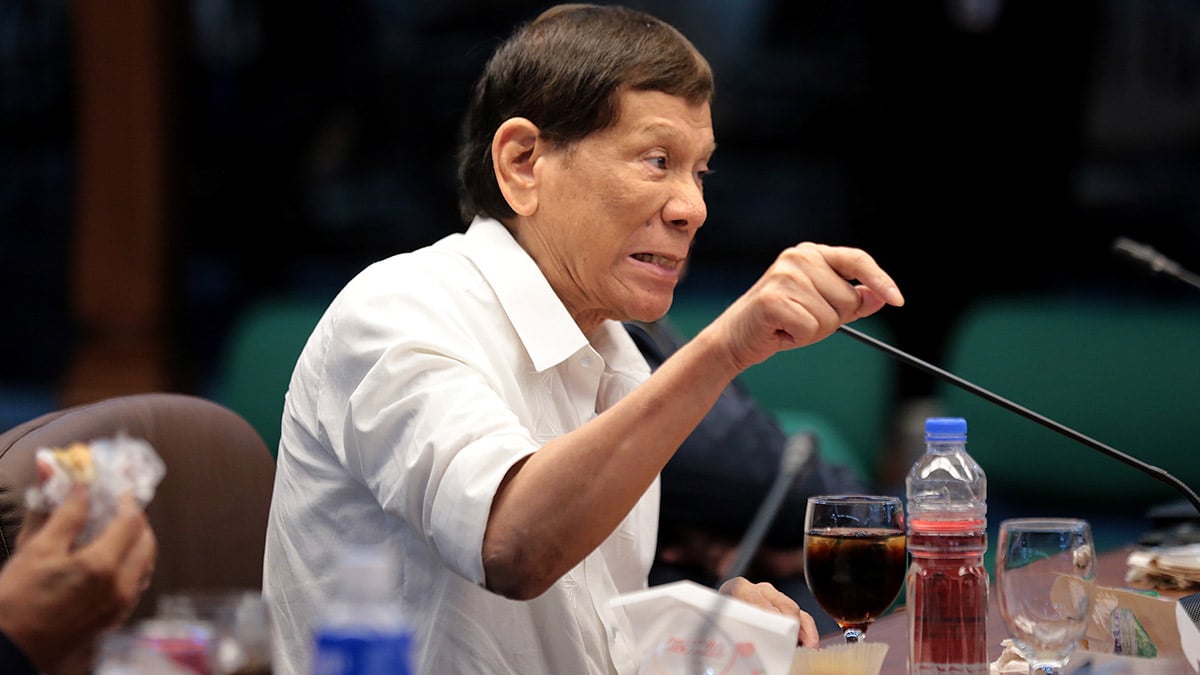
THERE GOES DECORUM The nation had a fresh dose of the expletive-laden rants of Rodrigo Duterte on Monday, as the former President appeared at the Senate and faced, for the first time since the end of his term, an official body revisiting his bloody war on drugs. —Grig C. Montegrande
MANILA, Philippines — Makabayan bloc lawmakers on Tuesday urged the Senate to submit to the International Criminal Court (ICC) its records on former President Rodrigo Duterte’s admission of urging policemen to “encourage” suspects to fight back as a pretext to kill them during the previous administration’s brutal war on drugs.
House Assistant Minority Leader Arlene Brosas also asked the Marcos administration to stop blocking the ICC probe following Duterte’s “brazen and unapologetic” admission during Monday’s Senate blue ribbon subcommittee inquiry, taking full responsibility for the extrajudicial killings (EJKs) in the drug war.
Brosas argued that the Philippines should cooperate with the ICC to give justice to the thousands of innocent victims of the antidrug campaign.
READ: Duterte: My PNP chiefs were ‘death squads’ heads
‘Damning confession’
According to House Deputy Minority Leader France Castro, Duterte’s testimony is a “damning confession that confirms what human rights advocates have been saying for years,” pointing out that “his admission of encouraging police to provoke suspects to fight back as a pretext for killing them is not just disturbing; it’s a clear violation of human rights and due process.”
The ACT Teachers party list representative stressed that the “nanlaban” (fought back) narrative was systematically used to justify thousands of drug war deaths, lamenting that “many innocent lives were lost under the guise of ‘nanlaban,’ even when victims clearly did not resist. Now we have direct confirmation that this was indeed official policy.”
“With Duterte’s own admission of responsibility, there should be no more delays in pursuing justice. His confession demands full cooperation with the ICC because as it is, justice is still hard to come by in our country especially when one is dealing with the former president,” Castro noted.
Public record
Senate President Francis Escudero on Tuesday said the ICC may get a copy of the hearing’s official transcript and other related documents since these are regarded as public documents.
However, he noted that there was no “formal communication or letter from the ICC for me to actually make an educated evaluation of what they will do or where they are right now in the current situation.”
At the Kapihan sa Senado media forum on Tuesday, Escudero also said that Duterte could not conveniently claim that he was just cracking jokes when he made several incriminating admissions under oath during Monday’s Senate hearing on his deadly war on drugs
“Most of the things he said were not actually new, right? The only difference now is that he uttered those words under oath,” Escudero said.
Preference for ICC
Lawyer Romel Bagares, executive director of the advocacy group Center for International Law, said on Tuesday that the EJK victims’ families may also prefer to seek help from the ICC due to possible hurdles to a fair prosecution here.
Those responsible for the drug war killings can be prosecuted for crimes against humanity under Republic Act (RA) No. 9851, or murder under the Revised Penal Code, he added.
However, he pointed out that families of the victims of EJKs may have “hesitations” when filing complaints against Duterte, “given how politics tend to get in the way of an honest-to-goodness prosecution of cases.”
“So the ICC may be the best option for them,” Bagares said.
Although the government has refused to work with the ICC in its investigation of the war on drugs, Bagares said the Philippines still must assist since the ICC has ruled that it will retain jurisdiction over crimes that happened while the country was still a member state.
This covers the period from Nov. 1, 2011, to March 16, 2019, when the government pulled out of the ICC. Duterte became president in 2016 and finished his term in 2022.
Under Article 93 of the Rome Statute, state parties have to comply with requests from the ICC to provide assistance in its investigations and prosecutions, such as the provision of official records and documents, Bagares pointed out.
Should the government refuse to comply with the ICC, Bagares said families of EJK victims may file for a petition for mandamus, which can be issued when “any tribunal, corporation, board, officer or person” unlawfully neglects their duties, according to the Supreme Court.
DOJ action
For the House quad committee probing crimes related to the drug war, it is now up to the Department of Justice (DOJ) to file criminal charges, including crimes against humanity, against Duterte.
The chairs of the quad committee said Duterte’s own words could provide the evidence needed to hold him accountable under RA 9851.
“Duterte has committed to take responsibility and face the consequences of these acts as mandated by our laws. It is now up to the proper authorities to consider this statement carefully and ascertain the criminal liability of the responsible individuals, whether under the concept of command responsibility or conspiracy,” said Manila Rep. Bienvenido Abante, chair of the human rights committee that forms part of the quad committee.
“When a leader knowingly permits the slaughter of civilians under his watch, and when he admits that he bears responsibility, it is an inescapable truth: he is criminally liable,” he pointed out.
Abante stressed that the systematic killings in Duterte’s war on drugs could fall under Section 6 of the law, which includes acts such as willful killing, torture, and enforced disappearance as crimes against humanity. Those crimes are nonbailable and could be punished by life imprisonment. —with a report from Krixia Subingsubing